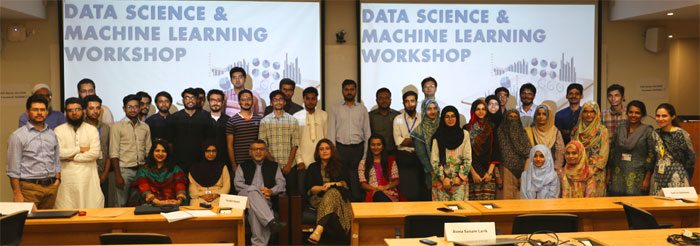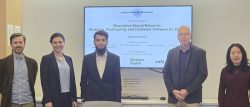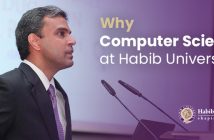Habib University’s Women in Computer Science and Engineering (WiCSE) initiative hosted a week-long workshop on Data Science and Machine Learning featuring an all female speaker list. The workshop took place at the Soorty Hall on campus from 10th – 14th July, 2017.
The speakers included professors and experts working in the subject area. Dr. Syeda Saleha Raza is an Assistant Professor of Computer Science at Habib University and has been actively involved in the areas of Robotics, Machine Learning, Probabilistic Reasoning and Computational Intelligence. Dr. Mobin Javed is a post-doctoral Research Scholar at the International Computer Science Institute, Berkeley and has research interests in Network Security, Privacy, and Internet Measurement. Dr. Humera Noor is a Software Engineer and Big Data specialist at Cliqz GmbH, and Ms. Hira Bashir is an analytics manager and co-founder of a US-based data science startup.

After a welcome note by Dr. Waqar Saleem, director of Habib University’s BS Computer Science program, Mr. Imran Moinuddin who is the founder and CEO of the Data Analytics company, NexDegree, kicked off the workshop with a keynote address on the Artificial Intelligence revolution and its impact, emphasizing the need to catch up with this huge technology shift in a socially responsible manner.
The workshop focused not only on technical topics such as Data Exploration, Data Mining, Visualisation, Big Data, and Data privacy, but on the ethics and responsibilities of working with data. The objective was to promote awareness among local students and professionals about the responsible use of data science and machine learning.
Participation in the workshop was open to the public. Given the technical nature of the workshop content, participants had to meet the minimum criterion of knowing at least one programming language fluently. From over 200 registrations from around Karachi, applicants had to be shortlisted for participation. Attendees ranged from students from Habib University and other local universities to industry professionals including faculty members from other institutions in Karachi.

A special feature of the workshop was its hands-on nature. While each session introduced new theoretical content, most of them also included practical examples and ended in programming exercises for the participants, which they performed as part of the workshop. Participants gained hands-on experiences in the areas of exploratory data analysis, data pipelining, predictive analytics, Big Data, and data visualization. The final day of the workshop was dedicated to a hackathon in which the participants created their own projects using their learnings from the previous four days.
After the presentations by the participants on their projects, Dr. Mobin was thoroughly impressed. “I was amazed to see the motivation and interest level of the participants,” she said, “the projects from the last day of the hackathon were very encouraging. The participants picked interesting datasets and came up with projects of their own ranging from predicting the risk of heart disease to predicting which people are likely to attend a data science workshop.”
In conversation with Dr. Humera, she explained how the students were encouraged to identify their own problem areas and then find workable solutions. Not only was she impressed with the students, Dr. Humera went on to say, “the entire experience of this workshop was awesome! Not only in terms of participants but also the impression the university gives- from food to cleanliness to (most importantly) the quality of the participants the university is able to get, everything left me impressed.”
Dr. Saleha mentioned that, in addition to promoting the field of Data Science and Machine Learning, the workshop also served the purpose of promoting female role models in our society who are doing exceptional work on cutting edge technologies. She applauded the whole team on successful organisation of this workshop and aimed to host more events of this type in future.

All of the speakers were pleased to see the number of women who showed interest in the field and were glad to see Habib University providing a space for a mix of people from different backgrounds to come together and learn more about different technological areas. The workshop was very well received by the participants who greatly appreciated the expertise and commitment of the speakers and the overall arrangements of the event.
While Pakistan is adapting to the technological world, there are not enough spaces where people can come together to learn about and discuss their shared interests. Habib University hopes to further the exposure of technical fields by hosting more events in the future making it BS Computer Science best university in Pakistan.




